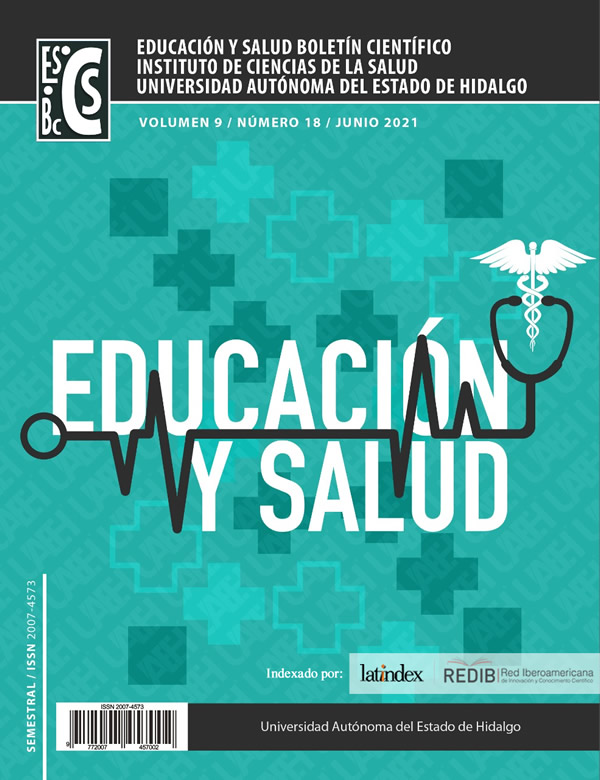Evaluation of emotional intelligence in daycare caregivers
Abstract
The emotional inteligence is an important topic that offers huge adventage and skills in the life of people, however, rarely is considered and used in institutions, especially in kindergarten where the children are in developing and are similars to sponges that are absorbing everything. For that reason, this investigation make an evaluetion of the emotional intelligence in 12 caregivers of kindergarten belonging to The Instituto Mexicano del Seguro Social (IMSS) through The Mayer-Salovey-Caruso Emotional Intelligence Test (MSCEIT) to know them leves and to adapt an intervention to adjustment to them needs. That intervention works in áreas of the emotional intelligence (emotional perception, emocional facilitation, emocional understanding and emotional management), self esteem, social skills and assertuveness. The results show a total of 8 caregivers (67%) in the total rating (CIE) got scores lower tan 90 points in the MSCEIT scale, what corresponds to the level of emotional intelligence called like “Aspecto to develop” which means that more than the half of the caregivers need improve in the area of emotional intelligence.
Downloads
References
El Fondo de las Naciones Unidas para la Infancia [Intermet]. México UNICEF; 2015 [citado 9 de abril de 2019. Recuperado a partir de: https://www.unicef.org/mexico/spanish/
Secretaría de Educación Pública. Aprendizajes Clave para la Educación Inicial. México: Secretaría de Educación Pública; 2017.
Bello-Dávila Z, Rionda-Sánchez H, Rodríguez-Pérez M. La inteligencia emocional y su educación. Varona. 2010;36-43.
Goleman D. Inteligencia Emocional. Barcelona: Kairós; 1999.
Ardila R. (2011). Inteligencia. ¿Qué sabemos y qué nos falta investigar? ev. Acad. Colomb.Cienc. 2011;35(134):97-103.
Ebbinghaus H. Memory a Contribution to Experimental Psychology. New York: Teachers College, Columbia University; 1885. Recuperado a partir de: https://archive.org/details
/memorycontributi00ebbiuoft/page/n5
Binet A. La inteligencia: su media y educación. Infancia y Aprendizaje: Journal for the Study of Education and Development. 1983;(22):115-120.
Sternberg R. Más allá del cociente intelectual: Una teoría triárquica de la inteligencia humana. España: Desclée de Brouwer; 1990.
Gardner H. Estructuras de la Mente. México: Fondo de Cultura Económica; 1994.
Salovey P, Mayer J. Emotional Intelligence. Imagination, Cognition and Personality. 1990;9(3):185-211.
Galimberti U. Diccionario de Psicología. México: Siglo Veintiuno; 2002.
Barchard K, Hakstian A. The nature and measurement of Emotional Intelligence abilities: Basic dimensions and their relations with other cognitive ability and personality variables. Educational and Psychological Measurement. 2004;64(3):437-462.
Mayer J, Salovey P, Caruso D. Models of Emotional Intelligence. En: Salovey P, Brackett M, Mayer J. The Handbook of Intelligence New York: RJ Sternberg; 2000. p. 396-420.
Rivas J, Ostinguín R. Cuidador: ¿concepto operativo o preludio teórico? Enfermería Universitaria. 2011;8(1):49-54. doi:http://dx.doi.org/10.22201/eneo.23958421e.2011.1.25471
Ramírez M. Cuidadoras de personas dependientes en situación de precariedad [Internet]. La Izquierda Diario. Red Internacional en 7 Idiomas. 2017 [citado 2 de marzo de 2017]. Recuperado a partir de: https://www.laizquierdadiario.mx/Cuidadoras-de-personas-dependiente s-en-situacion-de-precariedad
Instituto Nacional de Estadística y Geografía. Sexta Edición de la Encuesta Nacional del Empleo y Seguridad Social (ENESS). Comunicado de Prensa. 2018;1-21.
Introducción a la Guía Técnica del Programa Educativo para el Servicio de Guarderías el Sistema IMSS [Internet]. Instituto Mexicano del Seguro del Social. [citado 15 de junio de 2019]. Recuperado a partir de: http://siag.imss.gob.mx/instalacionsiag/guarderias/guias/gt_economica_completa.pdf
Fases del Proceso de selección del Personal que Ingresa a Laboral al Instituto Mexicano del Seguro Social. SlideShare. 2015 [citado 15 de junio de 2019]. Recuperado a partir de: https://es.slideshare.net/GatoImss/fases-del-proceso-de-ingreso-para-trabajar-en-el-imss
García J. La Educación Emocional su Importancia en el Proceso de Aprendizaje. Revista Educación. 2012;36(1):1-24.
Cejudo J, López M. Importancia de la Inteligencia Emocional en la Práctica Docente: Un Estudio con Maestros. Psicología Educativa. 2017;29-36.
Cabello R, Ruiz D. Docentes emocionalmente inteligentes. Revista electrónica interuniversitaria de formación del profesorado. 2010;13(1):41-49.
Díaz E. Estilos de Aprendizaje. Eídos. 2012;(5):5-11.
Secretaría de Educación Pública. Manual de estilo de aprendizaje. Ciudad de México: Dirección de Coordinación Académica. 2004.
Piaget J. El Nacimiento de la Inteligencia del Niño. Madrid: Crítica; 1977.
Casassus J. La educación del ser emocional. Chile: Cuarto Propio; 2007.
Wong R, Ho F, Wong W, Tung K, Chow C, Rao N, Chan K, Ip P. Parental Involvement in Primary School Education: its Relationship with Children’s Academic Performance and Psychosocial Competence
through Engaging Children with School. Journal of Child and Family Studies, 2018;1-12. doi:10.1007/s10826-017-1011-2
Luna S, Rivera F, Ramos P. Ajuste psicológico y clasificación de mujeres cuidadoras de nietos y nietas y/o ascendientes en función de su inteligencia emocional. Apuntes de Psicología. 2016;34(2-3):161-169.
Mayer J, Salovey P, Caruso D. Test de Inteligencia Emocional Mayer-Salovey-Caruso. Madrid: Ediciones Tea; 2009.
Extremera N, Fernández-Berrocal P, Salovey P. (2006). Spanish version of the Mayer-Salovey-Caruso Emotional Intelligence Test (MSCEIT). Version 2.0: Reliabilities, age and gender differences.
Psicothema. 2006;18:42-48.
Dolto F. La Dificultad de Vivir Volumen II. Barcelona: Gedisa; 1997.












